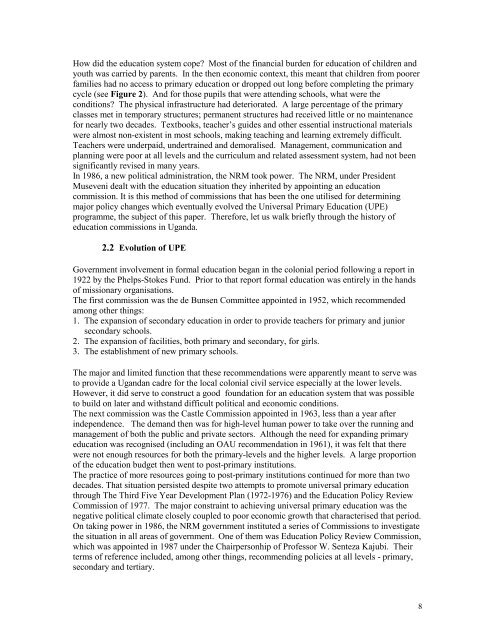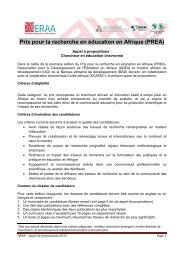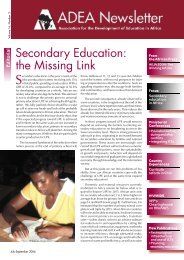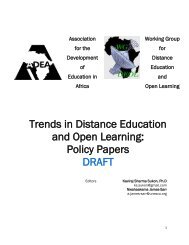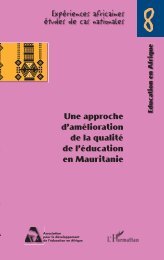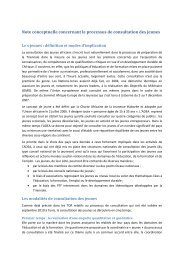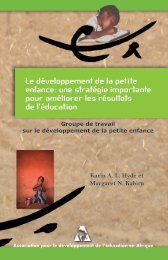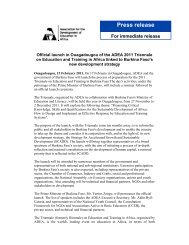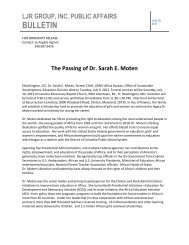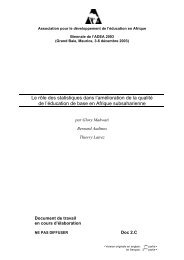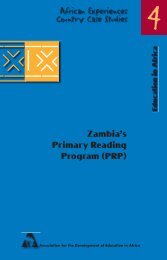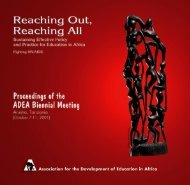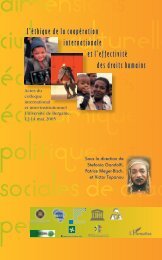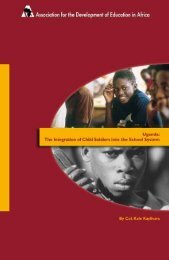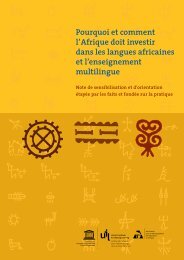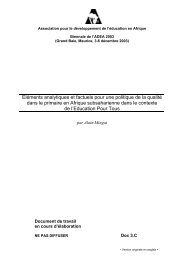the ugandan experience of universal primary education (upe) - ADEA
the ugandan experience of universal primary education (upe) - ADEA
the ugandan experience of universal primary education (upe) - ADEA
You also want an ePaper? Increase the reach of your titles
YUMPU automatically turns print PDFs into web optimized ePapers that Google loves.
How did <strong>the</strong> <strong>education</strong> system cope? Most <strong>of</strong> <strong>the</strong> financial burden for <strong>education</strong> <strong>of</strong> children and<br />
youth was carried by parents. In <strong>the</strong> <strong>the</strong>n economic context, this meant that children from poorer<br />
families had no access to <strong>primary</strong> <strong>education</strong> or dropped out long before completing <strong>the</strong> <strong>primary</strong><br />
cycle (see Figure 2). And for those pupils that were attending schools, what were <strong>the</strong><br />
conditions? The physical infrastructure had deteriorated. A large percentage <strong>of</strong> <strong>the</strong> <strong>primary</strong><br />
classes met in temporary structures; permanent structures had received little or no maintenance<br />
for nearly two decades. Textbooks, teacher’s guides and o<strong>the</strong>r essential instructional materials<br />
were almost non-existent in most schools, making teaching and learning extremely difficult.<br />
Teachers were underpaid, undertrained and demoralised. Management, communication and<br />
planning were poor at all levels and <strong>the</strong> curriculum and related assessment system, had not been<br />
significantly revised in many years.<br />
In 1986, a new political administration, <strong>the</strong> NRM took power. The NRM, under President<br />
Museveni dealt with <strong>the</strong> <strong>education</strong> situation <strong>the</strong>y inherited by appointing an <strong>education</strong><br />
commission. It is this method <strong>of</strong> commissions that has been <strong>the</strong> one utilised for determining<br />
major policy changes which eventually evolved <strong>the</strong> Universal Primary Education (UPE)<br />
programme, <strong>the</strong> subject <strong>of</strong> this paper. Therefore, let us walk briefly through <strong>the</strong> history <strong>of</strong><br />
<strong>education</strong> commissions in Uganda.<br />
2.2 Evolution <strong>of</strong> UPE<br />
Government involvement in formal <strong>education</strong> began in <strong>the</strong> colonial period following a report in<br />
1922 by <strong>the</strong> Phelps-Stokes Fund. Prior to that report formal <strong>education</strong> was entirely in <strong>the</strong> hands<br />
<strong>of</strong> missionary organisations.<br />
The first commission was <strong>the</strong> de Bunsen Committee appointed in 1952, which recommended<br />
among o<strong>the</strong>r things:<br />
1. The expansion <strong>of</strong> secondary <strong>education</strong> in order to provide teachers for <strong>primary</strong> and junior<br />
secondary schools.<br />
2. The expansion <strong>of</strong> facilities, both <strong>primary</strong> and secondary, for girls.<br />
3. The establishment <strong>of</strong> new <strong>primary</strong> schools.<br />
The major and limited function that <strong>the</strong>se recommendations were apparently meant to serve was<br />
to provide a Ugandan cadre for <strong>the</strong> local colonial civil service especially at <strong>the</strong> lower levels.<br />
However, it did serve to construct a good foundation for an <strong>education</strong> system that was possible<br />
to build on later and withstand difficult political and economic conditions.<br />
The next commission was <strong>the</strong> Castle Commission appointed in 1963, less than a year after<br />
independence. The demand <strong>the</strong>n was for high-level human power to take over <strong>the</strong> running and<br />
management <strong>of</strong> both <strong>the</strong> public and private sectors. Although <strong>the</strong> need for expanding <strong>primary</strong><br />
<strong>education</strong> was recognised (including an OAU recommendation in 1961), it was felt that <strong>the</strong>re<br />
were not enough resources for both <strong>the</strong> <strong>primary</strong>-levels and <strong>the</strong> higher levels. A large proportion<br />
<strong>of</strong> <strong>the</strong> <strong>education</strong> budget <strong>the</strong>n went to post-<strong>primary</strong> institutions.<br />
The practice <strong>of</strong> more resources going to post-<strong>primary</strong> institutions continued for more than two<br />
decades. That situation persisted despite two attempts to promote <strong>universal</strong> <strong>primary</strong> <strong>education</strong><br />
through The Third Five Year Development Plan (1972-1976) and <strong>the</strong> Education Policy Review<br />
Commission <strong>of</strong> 1977. The major constraint to achieving <strong>universal</strong> <strong>primary</strong> <strong>education</strong> was <strong>the</strong><br />
negative political climate closely coupled to poor economic growth that characterised that period.<br />
On taking power in 1986, <strong>the</strong> NRM government instituted a series <strong>of</strong> Commissions to investigate<br />
<strong>the</strong> situation in all areas <strong>of</strong> government. One <strong>of</strong> <strong>the</strong>m was Education Policy Review Commission,<br />
which was appointed in 1987 under <strong>the</strong> Chairpersonhip <strong>of</strong> Pr<strong>of</strong>essor W. Senteza Kajubi. Their<br />
terms <strong>of</strong> reference included, among o<strong>the</strong>r things, recommending policies at all levels - <strong>primary</strong>,<br />
secondary and tertiary.<br />
8


